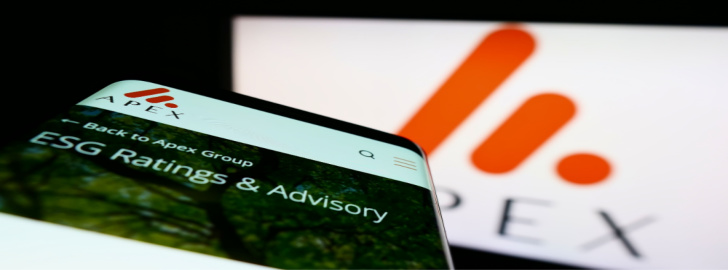Apex Group strives for ESG industry firsts in financial services
David Carrick, CFO of Apex Group, explains how following an ESG agenda is as vital in global financial services as any other business
David Carrick, CFO of Apex Group, explains how following an ESG agenda is as vital in global financial services as any other business

Apex Group, a global financial services company with 10,000 employees and more than 50 offices worldwide, considers ESG to be one of the top priorities on both its corporate and C-suite agenda.
CFO David Carrick explains that the company measures its own success – not just by its global scale and growth, but its focus on making a difference to “its people, the planet and society”.
“Each year, we proactively complete our own full ESG assessment and carbon footprint measurement so we can review ourselves and make sure we are making a positive impact not just on the environment but through our own policies and for the welfare of our people,” he says. “As a group we are also releasing a 2022 sustainability report. We feel it’s critical that we are transparent with the market so that we can be accountable to our investors, potential employees and prospective clients and have a benchmark for future performance in the ESG and Corporate, Social, Responsibility (CSR) space.”
Apex follows a “three lines of defence” governance model to achieve its ESG agenda, says Carrick. The first line of defence takes responsibility for managing risks and controls directly and delivering compliant services, processes and controls. Here, local risk committees are made responsible for managing local ESG risks, escalating issues and reporting to the group risk committee, executive committee and the group’s audit and risk committee.
The second line of defence, meanwhile, involves the risk, compliance and legal departments, which oversee and monitor the implementation of risk management practices, while the third line is internal audit, which provides independent assurance to the board on the effectiveness of management and governance, including the first and second lines of defence.

From a CFO’s perspective, being able to demonstrate strong ESG credentials is “good business practice because it offers competitive advantage in the short-term, helps drive long-term sustainable growth, and can also help to lower costs,” according to Carrick.
“We have a strong governance framework both within and outside the finance department. Our executive committee meet twice a week and ESG is a standing agenda item on our regular calls. As CFO, I am answerable to the ESG questions of all our stakeholders, including our private equity investors,” he says. “These investors require the companies they back to undertake thorough annual ESG assessments, and as a department we provide the necessary financial information for these reports so that we can be transparent to our investors, the market, our clients and employees.”
He explains that in his own role, he proactively supports the business and executive team in defining ESG goals and identifying its environmental and social impacts too, so that Apex can mitigate risks and improve its ESG profile. This involves helping to identify the most relevant ESG issues and metrics to manage ESG risk and safeguard the future of the business. The results are then translated into monetary terms and used to help embed sustainability into the corporate strategy. This is followed by continuous measurement, evaluation, and improvement of Apex’s ESG credentials and evolution of the policy.
Carrick points out that Apex’s ESG policy draws on the specialisms of multiple departments and the finance department sits at the core.
“In our finance team, I have encouraged cross-team collaboration and motivated finance stakeholders to implement ESG initiatives. Given the finance team’s extensive network across our business, as well as their specific skill sets, they are well positioned to help drive a holistic approach to ESG,” he says.
“The finance team has taken an active role in supporting the design and infrastructure needed to measure, analyse and report sustainability-related information. With regulations and new disclosure requirements gaining importance, the role of the finance team will continue to evolve and become more involved with Apex’s sustainability initiatives.”
He adds that the finance team also adheres to robust procurement policies and requires key vendors and suppliers to demonstrate their ESG principles and policies.
“I have encouraged Apex to undertake financial and risk assessments for ESG related activities. We also align our own ESG activities, such as offsetting, with industry standards,” says Carrick. “We take advice from our expert ESG team as to how we can analyse our ESG ratings and financial performance to give evidence of ESG in practice. “
Apex has achieved several industry-firsts in ESG as a financial services organisation, including independent verification of its financial and operational sustainability agenda. Credit ratings from Fitch, Moody’s and S&P Global are stable, reflecting the expectation that Apex will be able to sustainably increase its revenue and profitability over the next 12-18 months, according to Carrick.
Earlier this year, the company also became the first financial services provider to offset its entire lifetime of carbon emissions, becoming carbon neutral. It has also become a signatory of the Principles of Responsible Investment and a member of the Net Zero Asset Managers initiative.
In line with its focus on empowering women, meanwhile, the company launched its own ‘women’s accelerator programme’ this year, which aims to drive equality for female progression and diversity at all levels within the company. The programme also aims to accelerate the sustainable progress of high-performing female talent throughout the business and erode the gender disparity at mid and senior management levels to provide a clear path for career progression.
The company also runs ESG Impact Month, which aims to educate on, and raise awareness of, ESG issues in the financial services space, support the flow of capital to the right places and contribute financially to important charitable causes.
It has launched the not-for-profit Apex Foundation, with a donation from founder and CEO Peter Hughes, which aims to empower sustainable change by supporting grassroots charitable projects.
“As part of our commitment to women’s empowerment, education and social mobility, and the environment, Apex hosted a ‘purpose beyond service charity gala’ to raise vital funds for WaterAid, the Campaign for Female Education, Tusk Trust and the Blue Marine Foundation,” says Carrick, pointing out that the finance team played a key role in supporting the event.
Aside from this, Apex is also providing services pro-bono to Greater Share, a philanthropic fund providing unrestricted funding to eight education-focused NGOs. The company is also working with the American Cancer Society to provide fund administration services and will be donating 75% of its fees to the fund.
“The finance department has worked to ensure that all risk and financial reporting requirements are met to make these partnerships a success, whilst adhering to the highest levels of governance,” says Carrick.
He adds that Apex has also partnered with the not-for-profit NGO Eden Reforestation Projects, and in 2021 it planted 200,000 trees in Madagascar – ten trees for every new client contract signed and five for every five years of an employee’s tenure.
“Apex is also the official sustainability partner of Cricket West Indies (CWI) – the first partnership of its kind in the sport,” concludes Carrick. “As part of this partnership, the company is delivering its carbon footprint assessment and advisory services annually for CWI, with the ultimate target of supporting CWI to become carbon neutral.”